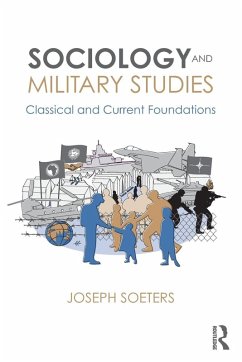
Understanding Military Doctrine
A Multidisciplinary Approach
Versandkostenfrei!
Versandfertig in 6-10 Tagen
49,99 €
inkl. MwSt.
Weitere Ausgaben:

PAYBACK Punkte
25 °P sammeln!
This book puts military doctrine into a wider perspective, drawing on military history, philosophy, and political science.Military doctrines are institutional beliefs about what works in war; given the trauma of 9/11 and the ensuing 'War on Terror', serious divergences over what the message of the 'new' military doctrine ought to be were expected around the world. However, such questions are often drowned in ferocious meta-doctrinal disagreements. What is a doctrine, after all?This book provides a theoretical understanding of such questions. Divided into three parts, the author investigates th...
This book puts military doctrine into a wider perspective, drawing on military history, philosophy, and political science.
Military doctrines are institutional beliefs about what works in war; given the trauma of 9/11 and the ensuing 'War on Terror', serious divergences over what the message of the 'new' military doctrine ought to be were expected around the world. However, such questions are often drowned in ferocious meta-doctrinal disagreements. What is a doctrine, after all?
This book provides a theoretical understanding of such questions. Divided into three parts, the author investigates the historical roots of military doctrine and explores its growth and expansion until the present day, and goes on to analyse the main characteristics of a military doctrine. Using a multidisciplinary approach, the book concludes that doctrine can be utilized in three key ways: as a tool of command, as a tool of change, and as a tool of education.
This book will be of much interest to students of military studies, civil-military relations, strategic studies, and war studies, as well as to students in professional military education.
Military doctrines are institutional beliefs about what works in war; given the trauma of 9/11 and the ensuing 'War on Terror', serious divergences over what the message of the 'new' military doctrine ought to be were expected around the world. However, such questions are often drowned in ferocious meta-doctrinal disagreements. What is a doctrine, after all?
This book provides a theoretical understanding of such questions. Divided into three parts, the author investigates the historical roots of military doctrine and explores its growth and expansion until the present day, and goes on to analyse the main characteristics of a military doctrine. Using a multidisciplinary approach, the book concludes that doctrine can be utilized in three key ways: as a tool of command, as a tool of change, and as a tool of education.
This book will be of much interest to students of military studies, civil-military relations, strategic studies, and war studies, as well as to students in professional military education.














